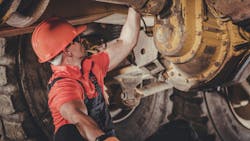Technician or mechanic? Language in shop reflects changing perceptions of profession
For years now, there’s been talk of what professionals in automotive repair should be called, and it’s something that Carm Capriotto, host of the Remarkable Results Radio Podcast, began to see as a growing weakness for the industry.
Titles that demonstrate expertise earn not only the confidence of customers but the inspiration of those seeking a career path: something that Capriotto has explored in depth in his recently released treatise, ‘The Rise of the Mechanical and Technology Specialist.'
Seeing room for growth
The language used in the repair industry affects not only how those on the outside view it, but sets a standard for those within the field. It’s a concept that first struck Capriotto while watching the FX series, ‘The Bear,’ which revolves around a professional chef named Carmen 'Carmy' Berzatto who steps in to take over his late brother’s sandwich shop.
Coming from a world of Michelin stars—an award to restaurants for outstanding cooking—Carm has a defined view of his role in the cooking industry. He comes into the kitchen dressed in a white chef’s coat, contrasted by the T-shirts and jeans of those surrounding him.
One scene stood out to Capriotto, in which Carm refers to one of the restaurant’s employees as “chef.” Though the rest of the restaurant had been aggressively opposed to any sort of change since Carm arrived, it was at that moment that the employee looked at Carm and replied, “Yes, chef,” and showed how much weight that title holds.
“Right there it hit me,” recalls Capriotto. “I wrote down the word 'chef,' and I said, ‘What's our word?’ And I couldn't find it.”
It’s something the industry has contended with for a long time. Terms such as ‘mechanic’ or ‘wrench’ are now viewed as outdated, and Capriotto has never been a fan of these labels. ‘Technician’ has been on the rise, though with it being used across various industries, he realized that the word itself doesn’t imply the full scope of what repair professionals do. He was led to pull inspiration from the medical field and how there are dedicated specialists for different areas of care.
All these words continue to float around in Capriotto’s mind–chef, technology, specialist–before he realized the language currently being used in the industry doesn’t reflect the diverse skill sets needed.
Accurately reflecting the industry
At the heart of this language shift is the change that’s already in motion with vehicle technology. As cars become more computerized and software based, there is a growing demand for those who know how to handle those aspects–Capriotto calls these individuals technology specialists.
But there will still be a need for those in the shop who work with their hands, and the technology specialist cannot exist without that counterpart.
“They're kinesthetic learners, they love what they do. ‘Just give me a wrench, give me a tool, give me something to take apart and put back together,’” explains Capriotto.
It’s one thing to perform diagnostics and understand what may be going wrong with a vehicle, but it’s a separate task to dive into the machine and repair its inner workings. A technology specialist does not sum up what these individuals do, and Capriotto has no desire to revive terms like ‘wrench’ or ‘mechanic.’
These people are specialists in their own right–they are mechanical specialists.
Read more: Recent stats point to root causes for technician turnover
Capriotto hopes the impact of such a change will be to empower the image of those in the repair industry. Amid a push for more young professionals to join the field, there is an importance in the job titles offered to entry-level techs that must be recognized.
“We got a career path lined up, (he) goes home talks to his spouse, significant other, mom or dad, brother or sister — he says, ‘Hey, I got a job at Bob's Garage down the road’ … ‘What, are you going to be a mechanic?’ ‘No, mom, I'm going to be a mechanical specialist.’ ‘Oh!’ There's the power of the language shift. There's the power of defining what it is that we do,” Capriotto says.
His declaration has been through several revisions already, continuing to grow and expand with the more shop owners he speaks to about the topic. The response he’s received has been overwhelmingly positive, and he’s only gained insight on how to improve upon the concept.
When Capriotto had the opportunity to share his declaration with ASE President and CEO Dave Johnson, he was met with immediate interest. Johnson reached out for a meeting, leading to Capriotto presenting his ideas to the ASE’s Board of Governors. The response was much in line with what he’s seen up to this point: supportive and enthused to find ways to improve it.
Making an idea into reality
The only issue shop owners have raised concerns over is how titles like technology specialist and mechanical specialist will impact the outreach of job listings. The SEO of these terms can extend into other fields, such as software designers–which can be a strength, but it needs to be clear that these are automotive service technology specialists.
Capriotto’s deceleration lists name suggestions for a variety of positions that may exist throughout a shop, but he deliberately calls them that: suggestions. Every shop does things a little differently.
Capriotto spoke with one shop owner who had a team that could handle both mechanical and digital jobs, who concluded to label them all technology specialists.
“I bless the fact that the shop owner was willing to adopt the new language, but I wasn't going to get in his way on how he defined what they do. That's between him and his people,” Capriotto says. “So I was just thrilled that they embraced it, and that they wanted to be technology specialists–stop and think what that could mean to their commitment of culture and training.”
Capriotto’s declaration isn’t meant to provide hard and fast rules, but rather a foundation on which to build–so to see shops taking the concept and using it to their benefit is the most important result of it all, and it’s something Capriotto is seeing plenty of.
As he was developing his declaration, he reached out to around 25 to 30 shops, sharing his first drafts and asking for their thoughts. He heard back from shop owners who sat down with their team, discussed the idea, and had already had new business cards made up for everyone by the time they responded to Capriotto.
As his message builds momentum, Capriotto expects it to go through many more changes as it adapts to the industry’s needs. Regardless of how it may grow, Capriotto believes he’s advocating for a movement that will bolster respect for the repair industry.
“It's refreshing. It will have an impact both on customer perception and culture inside the business,” Capriotto says. “And, dammit, let's become more professional. In the things that we do, the value prop that we give, and job titles. Let's be more professional.”
This article was originally posted on RatchetandWrench.com.
About the Author

Kacey Frederick
Kacey Frederick is an assistant editor for Endeavor Business Media's Vehicle Repair Group. Frederick covers innovations and trends in the automotive industry.

